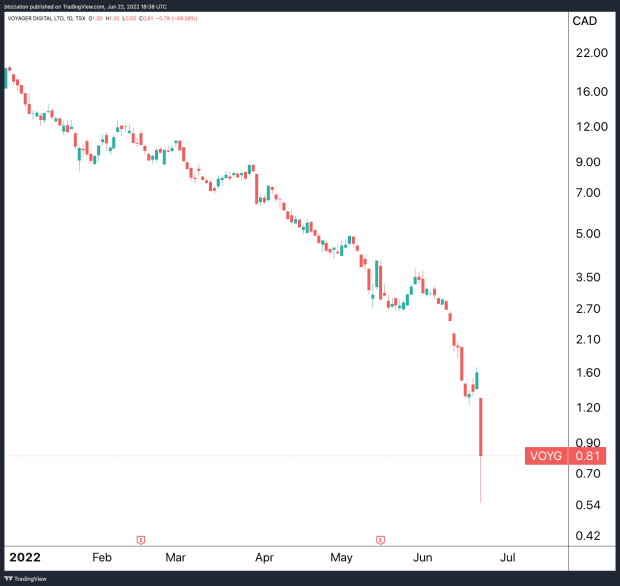Voyager Digital lent over half of its loan book to Three Arrows Capital and announced major losses due to this exposure. The company’s stock took a massive hit.

The below is an excerpt from a recent edition of Bitcoin Magazine Pro, Bitcoin Magazine’s premium markets newsletter. To be among the first to receive these insights and other on-chain bitcoin market analysis straight to your inbox, subscribe now.
Voyager’s Loan Book Exposure
Early on June 22, 2022, Voyager Digital, a crypto company which enabled users to deposit on their platform for yield, announced it took large losses from loans extended to Three Arrows Capital.
Their announcement follows some of our suspicions last week around Voyager and their lending counterparties.
Now, looking back at the Voyager press release today on the exposure to 3AC, consisting of 15,250 BTC and $350 million USDC, when marking the bitcoin to its value at the end of Q1, you get an approximate value of $1.04 billion or almost exactly the amount loaned to Counterparty A and B combined. Entry-level detective work brings you to find that 3AC, formerly based in Singapore, relocated to the British Virgin Islands last year before relocating again to Dubai this spring.

Unsecured Leverage
The last month in the crypto industry should serve as a lesson for experienced and new participants alike. “Yield,” often generated with layers of unsecured leverage on bearer assets is a ticking time bomb. One of the largest reasons that the effects of the “contagion” have been so strong has been due to this unsecured leverage.
Collateralized borrowing is one thing: You post over collateralized bitcoin in order to borrow dollars, and if the exchange rate of BTC/USD falls the borrower needs to either:
- Post more collateral
- Pay down the dollar-denominated debt
- Liquidate the bitcoin to pay down the debt
Unsecured lending, and the systemic risks it unveils throughout an industry, is the very thing that bitcoin was created to stop.
“The root problem with conventional currency is all the trust that’s required to make it work. The central bank must be trusted not to debase the currency, but the history of fiat currencies is full of breaches of that trust. Banks must be trusted to hold our money and transfer it electronically, but they lend it out in waves of credit bubbles with barely a fraction in reserve.” — Satoshi Nakamoto
For the sake of the industry and the bitcoin exchange rate, one can hope that we’ve heard the last of second and third order effects of the contagion.








